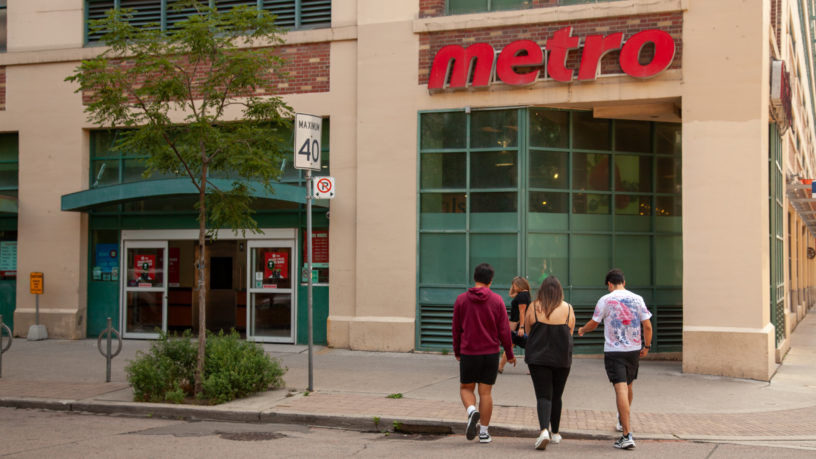By Dexter LeRuez
After weeks of uncertainty, Toronto Metropolitan University (TMU) students returned to school with the closest grocery store on campus, the Metro on 89 Gould St., being back open for business.
In July, Unifor Local 414, a union representing approximately 3,700 full and part-time Metro grocery store workers, released a statement announcing that union members had rejected a tentative settlement and would be heading to strike on the picket lines on July 29.
According to Samantha Henry, a worker at the Kennedy Road and Highway 401 Metro location, who was also on the bargaining committee during the negotiations, the initially rejected agreement would have seen a pay hike of $3.75 over the course of the four year and eight month long agreement.
However, workers were looking to see an immediate return to what Metro called “hero pay”, an incentive from early 2020 when Metro instituted a $2 per hour pay increase due to the dangers of the pandemic.
Henry stated that workers were angry after the removal of hero pay. “They called us heroes, frontline workers, gave us this $2 pay raise and as fast as they gave it to us they took it away.”
However, any fears that the store would be closed when school restarted were put down on Aug. 31, when Unifor announced the ratification of a new collective agreement in a press release on their website.
“They called us heroes, frontline workers, gave us this $2 pay raise and as fast as they gave it to us they took it away”
In the release, the union stated that the agreement “sets a precedent for further grocery store bargaining.”
According to the release, the agreement will see workers receive a $2 pay hike in the coming months, with a total pay hike of $4.50 over the course of the agreement.
The agreement will also provide new benefits such as a part-time sick leave program, a new standardized work week for full-time workers and job protection against the implementation of self-checkouts.
With the job action over, Metro stores released a statement declaring that all temporarily closed locations would reopen on Sept. 5.
Although the store on campus did in fact reopen just in time for the start of the school year, the uncertainty over the past month has led many students to think about how grocery stores impact their lives.
“That’d be a big blow to all the students,” said Raine Chen, a second-year geographic analysis student, on the possibility of losing the Gould Street Metro. “I feel like most students go to Metro quite often.”
For Chen, who lived in residence at TMU last year and had purchased a meal plan from the school, Metro acted as a late-night alternative when dining halls were closed.
“[Metro is] really convenient for me because sometimes when I was hungry, I just got late-night snacks from there, late-night drinks.”
However, for others who are not on a meal plan, Metro is the most straightforward way to purchase food throughout the school year.
“I have a friend who used to live at [the Daphne Cockwell Complex] in first year. He’d come down to Metro at Gould [Street] and just get his groceries,” said Chen.
Despite the convenience, many students find that shopping at Metro and other downtown grocery stores is putting a strain on their wallets.
“Because of inflation, the prices are really high right now,” said first-year new media student Xavier Vanderpool. “I feel like it’s pretty bad to buy groceries.”
As grocery prices rise, students like Vanderpool look for cheaper, lower-quality options while at the store.
“I [would] probably get one of the cheaper brands or if I see a price or a deal I [would] probably go for that before going for what I really want,” said Vanderpool.
For students like Vanderpool, their food sovereignty is at risk due to rising prices. Jacqui Gingras, a sociology professor at TMU, explains what food sovereignty is in more detail.
“Food sovereignty is when all people everywhere have the ability to choose the food that meets their cultural preferences,” said Gingras.
Gingras believes TMU can do more to become a food sovereign campus and points to Concordia University as a school moving in the right direction.
“Concordia has things like free lunches or very low-cost lunches like $5 lunches; they have cafés where they sell the food that they’ve grown on campus. Their food provider on campus is not one of the big multinational corporations.”
As for affordable on-campus alternatives, Gingras points to the Mutual Market as an organization working to acheive food sovereignty.
“That is part of a revolution on campus,” said Gingras. “People donate items and then [the market] sells them at cost so [they] can buy food to also sell at cost.”
The market, which The Eye reported on back in April, “is a student-led, non-profit market fair held every other Wednesday in the Student Campus Centre lobby during the winter time and outside when the weather is warm.”
“It’s an actual part of the solution,” said Gingras. “If students are not able to go to Metro to get food, they can go to The Mutual Market.”










Leave a Reply